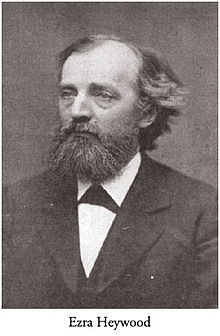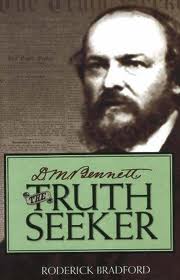Cupid's Yokes (pamphlet)
Date: 1877 1879
Region: North America
Subject: Political/Economic/Social Opinion
Medium: Print Journalism
Artist: Ezra Heywood (1829 - 1893)
Confronting Bodies: Anthony Comstock, a post office special agent and a leader of the social purity movement; The Society for the Suppression of Vice of New York
Date of Action: 1877, 1879
Location: United States of America
Description of Artwork: Heywood's 23-page pamphlet, Cupid's Yokes, is a critique of the institution of marriage. It argues that it is nothing more than a social contract that makes a woman into a "prostitute for life." Free love, he says, would create more equality amongst the sexes and shift sexuality from being something desired to something under the control of reason.
The Incident: In summer of 1877, Anthony Comstock arrested Heywood on the charges of mailing obscene publications. He was found guilty the following June after a brief trial in Boston and sent to prison for two years.
Results of Incident: Shortly afterwards, the National Defense Association began a campaign to free Heywood. The pamphlet was brought to the attorney general, who analyzed it and found it not obscene. President Hayes pardoned Heywood and declared that it was no crime to advocate the abolition of marriage.
However, a year later (1879), D.M. Bennett (1818 - 1882), a publisher of the free-thought paper Truth Seeker, was arrested by Comstock for distributing Cupid's Yoke through a mail order campaign. This time censors from the Society for the Suppression of Vice of New York wrote in to President Hayes, describing the pamphlet as "advocating indiscriminate intercourse" and being destructive to the "moral, physical, and spiritual life of youth." A pardon was not granted for Bennett.
Source: Censorship: A World Encyclopedia. Ed. Derek Jones. Chicago; London: Fitzroy Dearborn, 2001.

